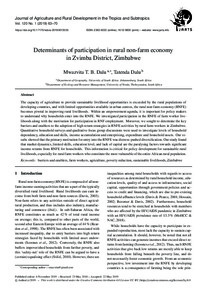Aufsatz

Determinants of participation in rural non-farm economy in Zvimba District, Zimbabwe
Zusammenfassung
The capacity of agriculture to provide sustainable livelihood opportunities is exceeded by the rural populations of developing countries, and with limited opportunities available in urban centres, the rural non-farm economy (RNFE) becomes pivotal in improving rural livelihoods. Within an empowerment agenda, it is important for policy makers to understand why households enter into the RNFE. We investigated participation in the RNFE of farm worker livelihoods along with the motivation for participation in RNF employment. Moreover, we sought to determine the key barriers and enablers to the adoption of high return strategies in RNFE activities by rural farm workers in Zimbabwe. Quantitative household surveys and qualitative focus group discussions were used to investigate levels of household dependency, education and skills, income accumulation and enterprising, expenditure and household assets. Our results showed that the primary motivation for entry into the RNFE was distress-pushed diversification. Our study found that market dynamics, limited skills, education level, and lack of capital are the paralysing factors towards significant income returns from RNFE for households. This information is critical for policy development for sustainable rural livelihoods, especially for rural farm workers who constitute the most vulnerable of the entire African rural population.
Zitierform
In: Journal of Agriculture and Rural Development in the Tropics and Subtropics (JARTS) Vol. 120 / No. 1 (2019-11-06) , S. 63-70 ; ISSN 2363-6033Zusätzliche Informationen
Gedruckte Ausg. im Verlag Kassel Univ. Press (www.upress.uni-kassel.de) erschienen.Sammlung(en)
Vol 120, No 1 (2019) (Journal of Agriculture and Rural Development in the Tropics and Subtropics (JARTS))Zitieren
@article{doi:10.17170/kobra-20190613555,
author={Dalu, Mwazvita T. B. and Dalu, Tatenda},
title={Determinants of participation in rural non-farm economy in Zvimba District, Zimbabwe},
journal={Journal of Agriculture and Rural Development in the Tropics and Subtropics (JARTS)},
year={2019}
}
0500 Oax 0501 Text $btxt$2rdacontent 0502 Computermedien $bc$2rdacarrier 1100 2019$n2019 1500 1/eng 2050 ##0##http://hdl.handle.net/123456789/11341 3000 Dalu, Mwazvita T. B. 3010 Dalu, Tatenda 4000 Determinants of participation in rural non-farm economy in Zvimba District, Zimbabwe / Dalu, Mwazvita T. B. 4030 4060 Online-Ressource 4085 ##0##=u http://nbn-resolving.de/http://hdl.handle.net/123456789/11341=x R 4204 \$dAufsatz 4170 7136 ##0##http://hdl.handle.net/123456789/11341
<resource xsi:schemaLocation="http://datacite.org/schema/kernel-2.2 http://schema.datacite.org/meta/kernel-2.2/metadata.xsd"> 2019-11-08T10:04:49Z 2019-11-08T10:04:49Z 2019-11-06 doi:10.17170/kobra-20190613555 http://hdl.handle.net/123456789/11341 Gedruckte Ausg. im Verlag Kassel Univ. Press (www.upress.uni-kassel.de) erschienen. eng Urheberrechtlich geschützt https://rightsstatements.org/page/InC/1.0/ barriers and enablers farm workers agriculture poverty reduction sustainable livelihoods Zimbabwe 630 Determinants of participation in rural non-farm economy in Zvimba District, Zimbabwe Aufsatz The capacity of agriculture to provide sustainable livelihood opportunities is exceeded by the rural populations of developing countries, and with limited opportunities available in urban centres, the rural non-farm economy (RNFE) becomes pivotal in improving rural livelihoods. Within an empowerment agenda, it is important for policy makers to understand why households enter into the RNFE. We investigated participation in the RNFE of farm worker livelihoods along with the motivation for participation in RNF employment. Moreover, we sought to determine the key barriers and enablers to the adoption of high return strategies in RNFE activities by rural farm workers in Zimbabwe. Quantitative household surveys and qualitative focus group discussions were used to investigate levels of household dependency, education and skills, income accumulation and enterprising, expenditure and household assets. Our results showed that the primary motivation for entry into the RNFE was distress-pushed diversification. Our study found that market dynamics, limited skills, education level, and lack of capital are the paralysing factors towards significant income returns from RNFE for households. This information is critical for policy development for sustainable rural livelihoods, especially for rural farm workers who constitute the most vulnerable of the entire African rural population. open access Dalu, Mwazvita T. B. Dalu, Tatenda publishedVersion ISSN 2363-6033 No. 1 Journal of Agriculture and Rural Development in the Tropics and Subtropics (JARTS) 63-70 Vol. 120 </resource>
Die folgenden Lizenzbestimmungen sind mit dieser Ressource verbunden:
Urheberrechtlich geschützt

